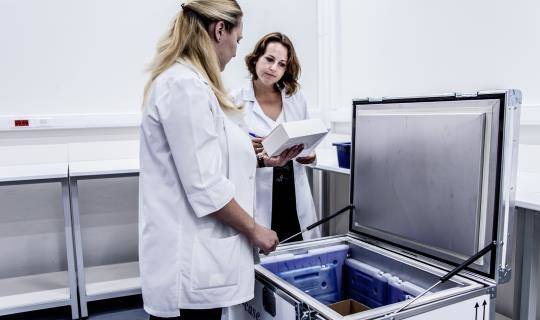Article: Seven Emerging Logistics Trends Accelerated by COVID-19
By World Courier
Enforced lockdowns, travel restrictions, and additional regulation have all played a part in fragmenting supply chains for time and temperature-sensitive drugs. Coupled with an increase in demand for specific APIs and specialty drugs, the industry needs to find new ways of working to continue to evolve.
Below, we explore seven trends that are impacting specialty biopharma supply chains. We’ve seen evidence of their emergence in the last three to five years, but they have accelerated in the past six months.
1. The Demand for Global Capability and Support for Imports
Many smaller, localized logistics providers have struggled to navigate the ever-changing issues of disrupted and closed transport routes, alongside regulatory changes.
The need for a global network and platform is more important than ever; one that is robust, agile and flexible enough to cope with increasingly dynamic variables. But global capability alone isn’t sufficient. Strong capabilities on the ground to navigate the intricacies of local customs rules to expedite the import process are also needed.
For example, the ability to leverage a Free/Foreign Trade Zone (FTZ) when importing APIs into the US, provides essential speed to market and considerably reduced costs.
2. Lower Temperature Requirements for Storage and Transport
We’re continuing to see the requirement for transport and storage at -40°C (-30°C - to -50°C) and -50°C (-40°C - to -60°C). As APIs or semi-finished products increasingly demand this, it is a requirement that is steadily on the rise. How can we find the flexibility to respond with precision?
World Courier’s VIP Thermal Container Solution is qualified for shipments at both -40°C and -50°C, and we continue to develop and qualify packaging at required temperature ranges through CORE labs.
3. The Requirement for an End-to-End Service
A single logistics partner to manage each component of the supply chain provides essential accountability and visibility, as well as operational efficiencies. The mutual understanding developed as part of a single supplier strategy allow for full control, in turn driving flexibility and an explicit understanding of project requirements and capabilities.
It’s important that across all stages of the drug supply chain there is an unbroken chain of custody and a full suite of solutions encompassing transport, storage, and packaging.
4. Use of Data, Tracking, and Visibility
Data continues to play an increasingly important role in the provision of end-to-end supply chain visibility – both in defining where disruptions are taking place and forecasting where they may occur. This is key when there are multiple supply chain participants.
It’s important to define data needs, whether this is for enhanced visibility of the locations of starter materials or temperature tracking. By adopting a range of different technologies, you can work with a partner to build a data solution to your key specifications.
5. Speed to Market
Speed to market for vaccinations has accelerated exponentially in the current climate, putting increased pressure on the supply chain. Currently, 40 candidate vaccines are in clinical evaluation1, with 11 in Phase 32. An additional 149 are in pre-clinical evaluation.
And where once traditional R&D would take 10 to 13 years, this process has been fast-tracked by regulators to an estimated 12 to 18 months. How will this then impact drug development long-term?
Will fast-track become the norm? If not what will be the qualification criteria? With the current cost of drug development estimated at $2.6 billion3, there will likely be intense pressure on the FDA to look at how long-term improvements can be made.
Rather than through a shift in regulation, could this be achieved by potential improvements and optimizations in government policies and processes? Following the pandemic speed-to-market model, certain processes may be made redundant, and fewer patients could be used in trials. And for manufacturers, the potential shift towards a fast-track approach makes it necessary to focus on post-approval supply chains much earlier than before.
6. The Shift from a Single Supplier Strategy
Lockdowns and limited availability have immediately illustrated the extent to which a few countries dominate the world supply of APIs and their chemical raw materials. In turn, this has highlighted the need across the industry to shift away from traditional single supplier strategies.
China’s Hubei province is home to producers of agents for 136 drugs including antibiotics, with 90% of active ingredients used in generics produced in the country. Since the beginning of March, India has restricted exports of 26 specified APIs and formulations until further notice to ensure there is enough supply for the country’s population in the face of global sourcing issues4.
Government initiatives may therefore be likely to energize the domestic production of drugs. For manufacturers, in the short term alternative suppliers are essential for continuity and risk-mitigation. In the long-term, key changes will likely be focused on more local production, re-shoring and more local sourcing.
7. Remote Audits of Facilities
How can you evaluate and onboard new suppliers amidst travel restrictions and global uncertainty? Before COVID-19, nearly 70% of organizations hadn’t conducted a remote audit of their logistics partners’ transport or storage operations5. Now they are much more likely to be considered.
When vendor audits need to be conducted every year or every two years, virtual audits provide key procedural benefits. They consist of using electronic means to remotely obtain audit evidence and evaluate it objectively to determine the extent of conformity to the audit criteria. For a successful remote audit, it’s important to ensure that efficient online connectivity, confidentiality, security, and trust between the two parties is in place. Where there are complex processes that can’t be audited online, these must be mentioned in a post-audit report. It is also essential to work with a provider that makes a complete audit dossier available.
The Fundamental Importance of Logistics Planning
As the requirements for specialty biopharma products become more complex, the pressure placed on logistics planning has never been more intense. Speed to market is key. Shipment integrity is fundamental. Temperature control needs have never been tighter.
And the global uncertainty caused by an ongoing and unprecedented pandemic has created several more layers of complexity and even less margin for error. International transport has arguably never been more complex at any time during the modern era.
Summary
World Courier has established an international network, with local experts across the globe that can transport your consignments wherever they need to be, pivoting when necessary. We have a robust record of reliably transporting pharmaceuticals to difficult-to-reach places, keeping within strict temperature ranges - 99.9% of our consignments are delivered without incident.
To find out more about World Courier’s approach to business continuity and risk mitigation within specialty drug supply chains, please get in touch.
1 https://www.who.int/publications/m/item/draft-landscape-of-covid-19-candidate-vaccines
2 https://www.nytimes.com/interactive/2020/science/coronavirus-vaccine-tracker.html
3 https://www.policymed.com/2014/12/a-tough-road-cost-to-develop-one-new-drug-is-26-billion-approval-rate-for-drugs-entering-clinical-de.html
4 World Courier white paper: Protecting your supply chain: lessons learned from COVID-19
5 https://www.worldcourier.com/insights/4-key-insights-on-carrying-out-a-successful-remote-audit

WEBINAR on-demand





